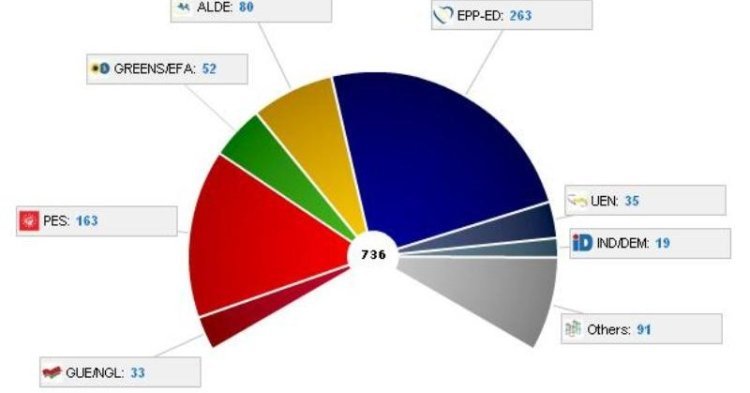Due to the multiple crises Europe has faced over the past couple of years, more radical elements from the left and particularly from the right are expected to be part of the next parliament – more than ever beforehand. As the European Parliament elections approach, a debate is rumbling across Europe about changes in European politics, the pressures on traditional centrist parties from increasingly vocal extremists and the practical policy impact of these trends.
The Economist’s first front page story of 2014 was entitled “Europe’s Tea Parties.” For example, UKIP could become the strongest British party in the European Parliament, the Front National in France could take the lead while the PVV of Geert Wilders could rise to the number one position in the Netherlands. And due to the recent decision of Germany’s constitutional court to abolish the 3% threshold, some new parties, including a neo-Nazi party and an anti-EU party, the “Alternative for Germany” (AfD) could get a couple of seats.
The platform http://www.pollwatch2014.eu/ is following closely the opinion polls and predictions in the 28 member states and provides the latest updates every two weeks on their website. The tendency over the past weeks has seen a positive trend for the EPP which is getting ever closer to the S&D. Both parties are predicted to have more than 200 seats and are way ahead of any other alliance. Nonetheless the latest prediction of 213 seats for the EPP is a slap in the face for the Conservatives as they gained 279 seats in the 2009 elections. And it can’t be an excuse that this time around there will be 751 Members of European Parliament (MEPs), 15 less than during the last period.
In contrast, the S&D currently has a slight lead of about 20 seats and could become the strongest force again – the first time since 1999. ALDE seems to lose almost a fourth of their seats (mostly due to the weakness of the FDP in Germany and LibDems in the UK) and the Greens even a third, as they are not able to get a single seat in a country that joined in 2004 or afterwards with the exception of one seat in Cyprus. In contrast, the Left (GUE) will probably double their amount of seats and will be fighting against the Liberals for the third place in the elections. Their main candidate Alexis Tsipras was able to rally new movements in his favor, such as “Tsipras List” in Italy, also supported by Barbara Spinelli, who support the main candidate of Europe’s left.
The anti-EU EFD will retain their 30 seats, while the euro-critic coalition of Conservative parties that left the EPP (led by the British Tories) will lose about a third of the seats. This is mostly due to drastic expansion of UKIP that will cost the Tories many seats. As the non-aligned – all those parties that do not have a formal alliance at the moment – will triple their seats according to the polls from 30 up to 90 seats. Thus, it will be easy to form at least one more party in parliament. Most likely, there is the threat that another right-wing formation will come into existence that are formed by right-extremist groups, among them Austria’s Freedom Party, the Dutch “PVV” of Wilders, the Flemish “Vlaams Belang,” the French “Front National,” the Italian “Lega Nord,” and the “Swedish Democrats.” These parties are currently not aligned in a group but finally want to change that.
A very tight race can be expected between the two leading candidates for the president of the European Commission. The EPP announced that the long-standing prime minister of Luxembourg, Jean-Claude Juncker will be their head runner against the current president of the European Parliament, Martin Schulz (S&D). At the moment Schulz is slightly ahead, which would make him the next president of the Commission, since – in theory – voters’ decision in the European elections should be reflected in the Commission and the strongest party should get the top job. This link with the outcome of the Parliament elections will allow for a more politicized Commission, something that will help Europe’s citizen to distinguish policies much more instead of the current technocratic approach.
S&D and EPP are so close at the moment that both of them can make it. Radical groups will be stronger than ever but will be kept in check in general terms, contrary to the many claims that one can read in European media outlets. Thus, this should be a matter of concern but should not be overplayed. In general terms, the next parliament will be one that is constructive and will favor European integration. However, it will be absolutely crucial that European citizens participate in the elections. The higher the participation, the less likely radicals will perform strongly, and hence common sense should prevail. Thanks to the Lisbon Treaty the European Parliament is stronger than ever before. With a candidate for the Commission, the vote in the election has more influence than ever before. Thus, more electoral participation in the election will be necessary to further strengthen the only directly democratic force of EU institutions.


Follow the comments: |
|
